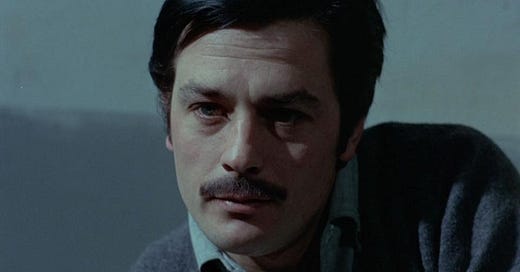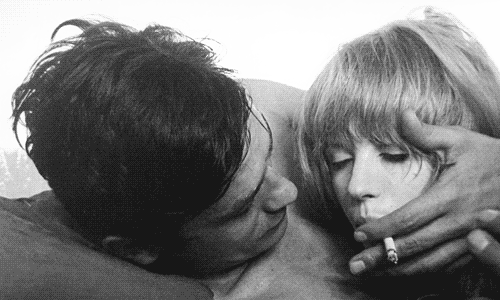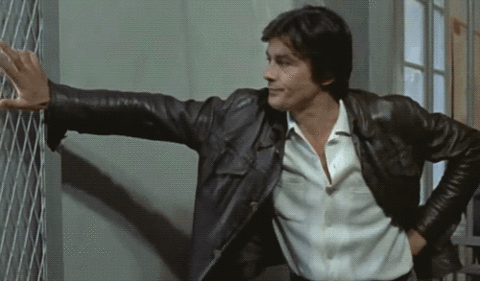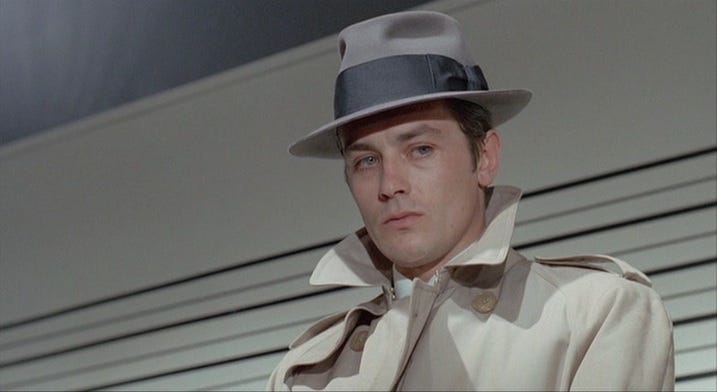Alain Delon heard that Gena Rowlands had died, and thought, “What even is the point anymore, I’m out.”
In 2019, I wrote a piece for Oscilloscope’s “Musings” blog, a piece years in the making: on scenes in movies where men stare at themselves in the mirror. Women looking in the mirror means one thing, symbolically, cinematically. Men looking in the mirror, traditionally, means something else. This “trope” goes back almost to cinema’s beginnings. Alain Delon has one of my favorite “staring at himself in the mirror” moments in Purple Noon, and I included a discussion in it of my piece.
I am interested in Alain Delon and how he did what he did. I have written a lot about him. There is something there to be grappled with, especially in regards to his intimidating chilly beauty and his obvious awareness of it. His beauty was an accident of genetics. He somehow seemed to feel he had nothing to do with it. (As indeed he didn’t.) He didn’t preen as an actor. And he could have! But he didn’t, he didn’t need to. He sunned himself by the pool in La Piscine and he was so beautiful it was almost off-putting. Beauty beckons but it also discourages. His was not an inviting kind of beauty. He was aware of what he looked like, and his awareness was certainly in operation in his performances, but he was not self-conscious about it. He was beyond that. Somehow. It’s mysterious.
Maybe his strongest asset as an actor was that it was immaterial to him whether or not you loved him. He couldn’t care less about you. You were irrelevant to him.
He was capable of warmth and sincerity - see Rocco and His Brothers. It’s genuine. He was also capable of being activated and frenetic - see L’Eclisse, particularly those scenes in the stock market, where he shivers with intention and adrenaline. He’s thrilling. His charm is devilish, seductive, playful.
Beneath the beauty there was a pit of unknowability. He was almost entirely opaque. His eyes were light and icy-blue, and yet they gave an impression of pitch-black-ness. There are moments in Le Cercle Rouge where they look like dark pits in his head. Eyes are windows to the soul? Yeah, not really. His eyes told no tales. The mystery remained intact. Always. This is what made him a great movie star, and more than that, an indelible and important movie persona. Like Dietrich. Or Cary Grant. Two insanely gorgeous almost otherworldly andrognynous creatures who managed to be both transparent and mysterious at the same time. Persona as strip-tease, where the ultimate reveal STILL withholds something essential.
Everyone has an inner life. It shows on our faces, in our gestures, in our hesitations, in the thoughts that flicker through our eyes. It shows whether we want it to or not. Alain Delon’s characters have inner lives. But the glimpses we get of it – in Le Cercle Rouge, in Purple Noon, in Le Samourai – make us recoil, rather than draw nearer. What he showed us was never explicit. It was never sentimental (“Here is the inner pain I am managing.”), it was never offered by way of explanation (“See? This is what I am dealing with.”) It was more a feeling, a sense. (I wrote a lengthy piece of “character” analysis – in quotes because there really IS no “character” and that’s the point – of Jef in Le Samourai where Delon revealed not depth, so much as nothingness.)
There was the beauty, right? Beauty seduces. We are moths to flame, and etc. With someone like, say, Marilyn Monroe … the beauty was a soft whispering entreaty to admire, to love, to protect. Her beauty was profound (and rare) in that way. The same was true of Elvis, who was so intimidatingly gorgeous in person that people HAD to address it, sometimes blurting out, “My God, you are gorgeous” right to his face. Carl Perkins shook his hand when he first met him, kept it together as they exchanged pleasantries, and the second Elvis walked away, Carl said to Scotty Moore, “That is the best-looking man I have ever seen in my life.” It wasn’t just women who felt it. Men were in thrall to it too. But, like Monroe, Elvis’ beauty gleamed, emanating from an inner spotlight, and people clustered around him hoping the light would shine on them. Maybe his charisma would rub off.
But Delon’s beauty had a forbidding quality.
It says “Stay away”.
Delon did not always play chilly sociopaths, but smart directors understood this forbidding quality was his ace in the hole. There was something criminal about it. His beauty was indistinguishable from amorality. The beauty was not illuminated by the inner spirit and soul. The beauty covered a blank void (I have written about this “blank”-ness ad nauseum).
There was a disconnect between the matinee-idol looks and the inner life, and the disconnect did not appear to be a conscious acting choice, or anything manipulated by Delon, but rather an organic expression of his natural temperament.
This is another reason why Alain Delon was a Great Movie Star. His persona was pleasing, but it was destabilizing. Things didn’t add up. You couldn’t get to the core of it. There were gaps. The center was elusive. You could not find the bottom.
Maybe there was no bottom.
And that’s why people who got too close took one look at him, and drew back, alarmed.
It is this elusive hard-to-pin-down-ness that makes a great star. If everything is explained and revealed, then there is no mystery, and no reason to keep coming back.
Even though Delon came off as remote and unreachable, it was not because he was focused on himself. He did not emanate egotism or garden-variety narcissism. You didn’t know WHAT he was focused on. Maybe it was something existential (he was French, after all) or maybe it’s some deep psychic wound from before memory even existed.
Or maybe he wasn’t “focused” on anything at all, and that’s why we couldn’t look away, that’s why we draw closer to him, because what was it like to be focused on nothing, nothing at all?
What was it LIKE in there, behind those icy eyes?
















Good God, Sheila…these two pieces…Rowlands and Delon, are brilliant descriptions of personality and behavior, both obvious and hidden. You get inside these people (and all of us!). We are all mysteries to ourselves. Love the notion that writers, and artists in general, are observers who crave apartness, time to think. You nail the confusing wonder of it all in both of these tributes! Way to go!
This description of Delon really brings to mind Tosches's bio of Dean Martin for whatever reason, a similar kind of unknowability